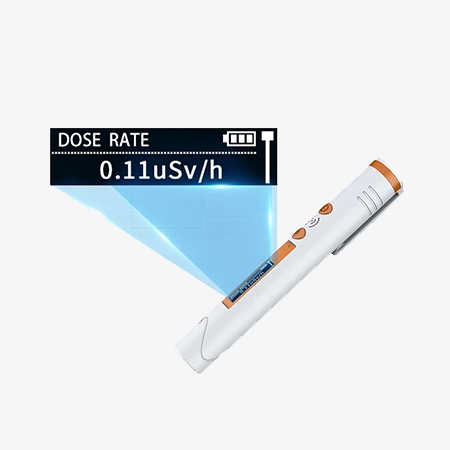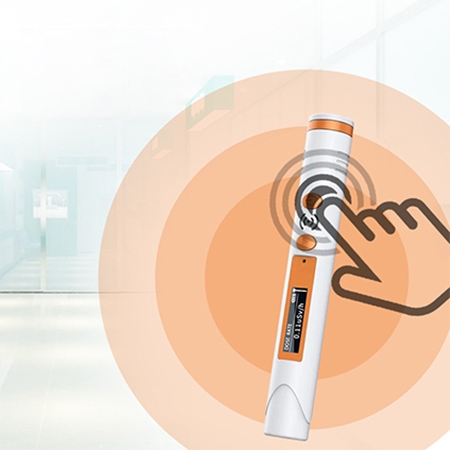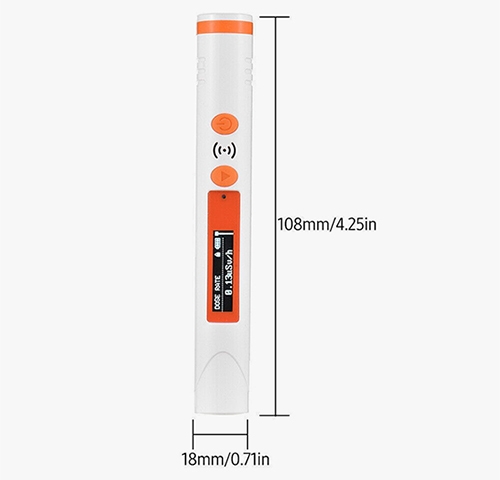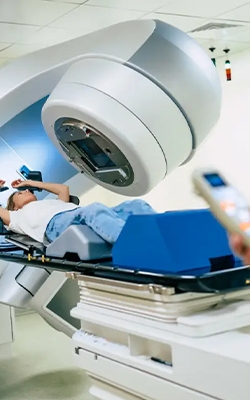This portable small radiation meter adopts a low energy consumption OLED display screen to display the instantaneous dose, average dose, and cumulative dose. This nuclear radiation detector is suitable for various scenarios, such as the nuclear industry, environmental monitoring, experimental physics, medical radiation, personal safety, etc.

Adopt OLED display screen, which can display instantaneous dose rate, cumulative dose and average dose rate
- The nuclear radiation detector is equipped with a high-contrast OLED display, providing clear and crisp visual information, even in low-light environments.
- The screen shows real-time readings of the current radiation dose rate, allowing users to monitor exposure levels instantly.
- The pocket radiation detector tracks and displays the total accumulated dose over a specific period, helping users assess long-term radiation exposure.
- The radiation meter also calculates and displays the average dose rate, offering a comprehensive overview of radiation exposure trends.

The radiation meter built-in GM technology tube
- The digital radiation detector utilizes an integrated Geiger-Müller (GM) tube, ensuring highly sensitive and accurate detection of ionizing radiation, including alpha, beta, and gamma particles.
- GM tube technology is a well-established method for radiation detection, offering precise readings and robust performance across a range of environments.
- The built-in GM tube provides long-lasting reliability, minimizing the need for frequent maintenance or replacement while ensuring consistent detection accuracy.
Dimension

Applications
SISCO radiation detector is a device used to detect and measure ionizing radiation, such as alpha, beta, gamma rays, and neutrons. Radiation detectors are used in medical imaging, industrial safety, environmental monitoring, and security to measure ionizing radiation. They help ensure safe radiation levels, detect contamination, and prevent the unauthorized transport of radioactive materials. They’re also crucial in scientific research for studying radiation effects.

Environmental

Security

Industrial

Medical
| Model | SISCO-RD-HFS-P3 |
| Sensor | 44mm Geiger counter tube |
| Measurement Range | 0.05μSv-50mSv |
| Measurement Accuracy | -17%-25%, based on 137 CSγ |
| Operating Temperature | 20-50℃ |
| Operating Humidity | <95% RH without condensation |
| Charging Port | Type-C interface |
| Detection Ray | X, β, γ ray |
| Weight | 20g |
Q1: What is a radiation detector?
A1: A radiation detector is a device designed to detect and measure ionizing radiation, such as alpha, beta, gamma rays, and neutrons. These detectors work by sensing the interaction of radiation with matter, often producing an electrical signal that correlates with the intensity or type of radiation present. Radiation detectors come in various types, including Geiger-Müller counters, scintillation detectors, and solid-state detectors, each tailored to detect different forms of radiation or provide varying levels of sensitivity.
Q2: Do radiation detectors need calibration?
A2: Yes, radiation detectors need regular calibration to ensure accurate and reliable measurements. Calibration involves adjusting the detector to account for any changes in its performance over time, which can be caused by factors such as aging components, environmental conditions, or variations in detector sensitivity. Regular calibration helps maintain the accuracy of the readings and ensures that the detector provides precise data for assessing radiation levels. Calibration is typically performed using known radiation sources and may be required by regulatory standards to ensure compliance and safety.
Q3: Can radiation detectors detect non-ionizing radiation?
A3: Most radiation detectors are designed to detect ionizing radiation, such as alpha, beta, gamma rays, and neutrons. Non-ionizing radiation, which includes radio waves, microwaves, infrared, and visible light, requires different types of sensors. For example:
- Radio frequency (RF) meters and electromagnetic field (EMF) meters are used to measure non-ionizing radiation like radio waves and microwaves.
- Photodetectors (such as photodiodes) measure visible light, while infrared sensors detect infrared radiation.
Tips: What are the main types of radiation detectors?
- Geiger-Müller (GM) Counters: Detects alpha, beta, and gamma radiation. Commonly used for general radiation monitoring.
- Scintillation Detectors: Uses scintillating material to detect radiation by converting radiation into light, which is then measured.
- Solid-State Detectors: These use semiconductors like silicon to detect radiation, often providing high energy resolution.
- Neutron Detectors: Specifically designed to detect neutron radiation.
- Proportional Counters: Can differentiate between different types of radiation by measuring energy levels.
Thank you for buying industrial test and measurement equipment on SISCO.com, all products sold by SISCO and the partner cover a 12 months warranty, effective from the date of receiving the products.
What is covered?
SISCO is responsible for providing free spare parts, and free technical support to assist the customer to repair the defective products until the problem is solved.
What is not covered?
- Product purchased from anyone other than a SISCO store or a SISCO authorized reseller.
- Expendable parts.
- Routine cleaning or normal cosmetic and mechanical wear.
- Damage from misuse, abuse or neglect.
- Damage from use of parts other than SISCO approved.
- Damage from use outside the product’s usage or storage parameters.
- Damage from use of parts not sold by SISCO.
- Damage from modification or incorporation into other products.
- Damage from repair or replacement of warranted parts by a service provider other than a SISCO authorized service provider.
- Damage caused by the application environment not meeting the product usage requirements and the failure to perform preventive maintenance.

